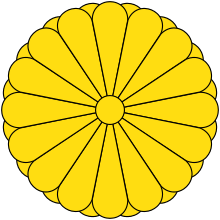Fukoku kyōhei
Fukoku kyōhei (富国強兵, "Enrich the state, strengthen the military"), originally a phrase from the ancient Chinese historical work on the Warring States period, Zhan Guo Ce, was Japan's national slogan during the Meiji period, replacing the slogan sonnō jōi ("Revere the Emperor, Expel the Barbarians").
Etymology
During the Warring States period of China, the Qin—through its Legalistic policies—placed considerable focus on the enhancement of state wealth and military power, also known with the expression Fuguo Qiangbing.[1] This expression was adopted in Meiji Japan as Fukoku kyōhei in Japanese.[1]
Significance
The slogan was the central objective of the Meiji leaders. Fukoku kyōhei entailed the formulation of far-reaching policies to transform Japanese society in an all out effort to catch up with the West. Although the government played a major role in providing the setting for industrialization, destroying old institutions that proved obstacles to industrialization and creating new institutions that would facilitate economic and political modernization, private enterprise also played a critical role in the distinctly Japanese combination of public and private sector effort later criticized in the 1980s as "Japan Inc." This symbolized an emerging nationalism in Japan.
History
Originating from the Iwakura Mission to Europe, the phrase not only demonstrated national objectives, but also revealed awareness of the predatory nature of international politics at the time. Both Ōkubo Toshimichi and Itō Hirobumi called for the advice of German Chancellor Otto von Bismarck; his advice convinced the Meiji leaders of the necessity for a militarily and economically strong Japan and nationalism in order to preserve independence.
The fukoku kyōhei objective led to massive governmental overhaul. Okubo thought that the Meiji government had to play a key role and formulate a clear set of policies. He thus espoused mercantilist visions and rejected the free trade ideas of Fukuzawa Yukichi. Itō Hirobumi also cautioned against free trade – he advocated the establishment of a protective tariff to ensure the prosperity of domestic manufactures. However, when the tariff has outlived its usefulness, Japan should imitate England and permit free trade. But before Japan could decide on its own foreign trade policy, it first had to get rid of the unequal treaties imposed by the imperial powers in the 1850s.
The industrial policy that resulted had 5 components:
- (1) An active role for the state in the development of the economy;
- (2) import substitution for industries that would compete with imports – the most important being cotton goods in textiles, threads and yarns;
- (3) adoption of Western technology to increase production of sophisticated products;
- (4) export development of crafts, tea and raw silk but also increasingly value-added products;
- (5) avoidance of relying on foreign loans.
All in all, this imitation of the West did not ameliorate tensions between Japan and Europe. It was taken rather as a sign of Japanese acceptance of realpolitik. Japan’s increasing trade and industrialization was meant to combat the West’s influence by becoming militarily and financially strong enough to become an actor in Imperialism.
